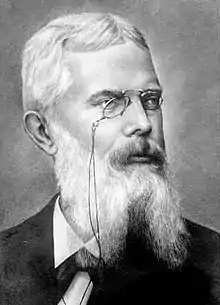Franz Mehring
Franz Erdmann Mehring (27 February 1846 – 28 January 1919) was a German communist historian and revolutionary socialist politician who was a senior member of the Social Democratic Party of Germany during the German Revolution of 1918–1919.

Biography
Early years
Mehring was born 27 February 1846 in Schlawe, Pomerania, the son of a bourgeois family.[1]
Political career
Mehring worked for various daily and weekly newspapers and over many years wrote lead articles for the weekly magazine Die Neue Zeit.
In 1868, Mehring moved to Berlin to study and worked in the editorial office of the Die Zukunft newspaper.
From 1871–1874, Mehring worked for the Correspondence Office in Oldenburg, writing reports on sessions of the Reichstag and the local parliament. He became a well-known parliamentary reporter, working for the Frankfurter Zeitung newspaper and Die Waage, a newspaper published by Leopold Sonnemann (1831–1909).
Mehring left Die Waage after an argument with Sonnemann and in 1884 became chief editor of the liberal Berlin Volks-Zeitung newspaper. He spoke out against Otto von Bismarck’s law banning socialism, although he was himself a member of the bourgeoisie. In 1891, Mehring joined the Social Democratic Party of Germany (SPD).
In 1893, Mehring was the recipient of a letter from Friedrich Engels, in which the latter first wrote the phrase False consciousness.[2]
Between 1902 and 1907, Mehring was the chief editor of the Social Democratic Leipziger Volkszeitung newspaper.[1]
From 1906 to 1911, Mehring taught at the SPD's party school and was a member of the Prussian parliament from 1917 to 1918.
During World War I, Mehring began to distance himself from the SPD, along with other members who believed the party was abandoning its Socialist Agenda by passing a bill to send more troops to war. In 1916, the left-wing Marxist revolutionary Spartacus League was founded and Mehring was one of its main leaders alongside Karl Liebknecht and Rosa Luxemburg.[1]
Mehring was sympathetic to the Bolshevik organization in Russia and to the cause of the October Revolution.[1]
Mehring wrote a Marxist analysis of the actions of Swedish warrior king Gustavus Adolphus which rejected the official explanation of the Thirty Years' War as having been rooted in religion, arguing instead that the economic and social interests of various classes were the actual spurs to action. After "long and irritating delays owing to the military censorship" (according to the English translator Edward Fitzgerald, 1935 U.S. edition), Mehring's Karl Marx: The Story of His Life was published in 1918.[3] The classical biography of Marx,[3] it was dedicated to fellow Spartacist Clara Zetkin. The book was later translated into many languages, including Russian (1920), Swedish (1921–1922), Danish (1922), Hungarian (1925), Japanese (1930), Spanish (1932) and English (1935).[4]
Death and legacy
Already in ill health, Mehring was deeply affected by the death of his comrades Rosa Luxemburg and Karl Liebknecht in January 1919.[1] He died just under two weeks later on 28 January 1919 in Berlin at the age of 73.
Mehring's papers reside as fond 201 at the Russian Center for Preservation and Research of Modern Historical Documents (RCChIDNI) in Moscow.[5] This material is also available for use by scholars on three reels of microfilm, with permission required by the center before extensive extracts may be published. Mehringdamm, Mehringplatz and the NVA Air Force Officer's Academy that was located in Kamenz were all named after him.
Footnotes
- Pierre Broué, The German Revolution, 1917–1923 (1971). John Archer, trans. (2006). Chicago: Haymarket Books. p. 977.
- Engels, Friedrich (1949). "Letter to F. Mehring". Karl Marx and Friedrich Engels: Selected Works in Two Volumes, Volume II. Moscow: Foreign Languages Publishing House. p. 451.
Ideology is a process accomplished by the so-called thinker consciously, it is true, but with a false consciousness. The real motive forces impelling him remain unknown to him; otherwise it simply would not be an ideological process.
- McLellan, David (1995). Karl Marx: A Biography. London: Papermac. p. 444. ISBN 0-333-63947-2.
- "WorldCat search". August 19, 2010.
- Franz Mehring Papers at the International Institute of Social History, see line "Location of Originals" in tab "Content and Context"
External links
- Franz Mehring Internet Archive at Marxists Internet Archive.
- Newspaper clippings about Franz Mehring in the 20th Century Press Archives of the ZBW